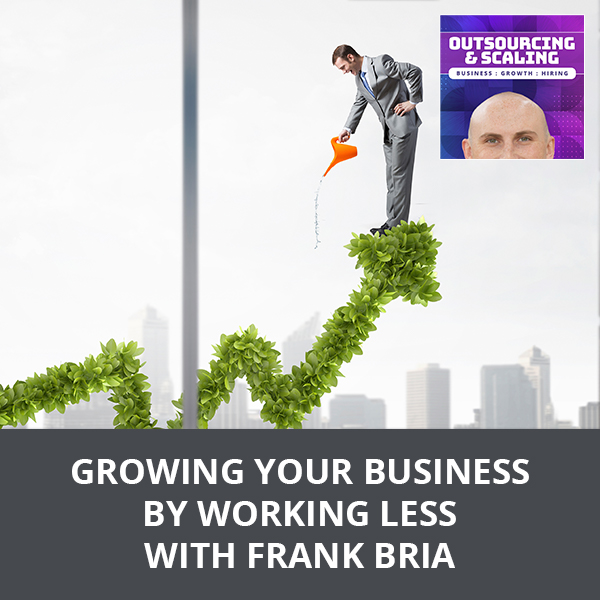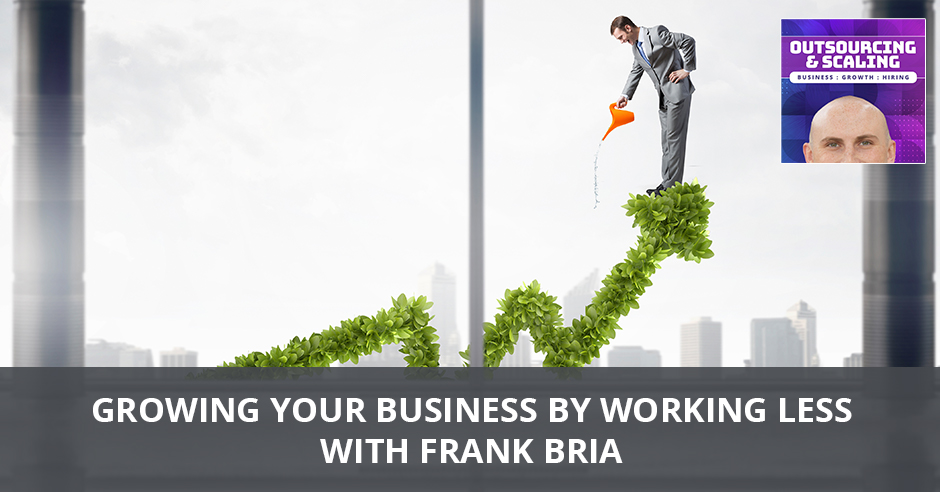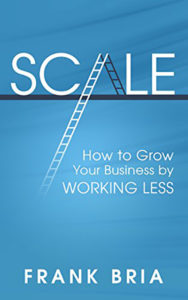


Imagine what your life would be like if you can learn how to grow your business by working less. This episode teaches you how to do it as host Nathan Hirsch talks with entrepreneurial veteran Frank Bria. Frank is the go-to authority on scalable program design and execution and the author of the internationally bestselling book, Scale: How to Grow Your Business by Working Less. Today, he shares how he got into entrepreneurship, hiring and onboarding virtual assistants, working with freelancers, and high ticket sales. He also reveals what entrepreneurs are doing wrong when they could be scaling faster and working less.
—
Listen to the podcast here:
[smart_track_player url=”https://www.podetize.com/statsapi/www.podetize.com/wp-content/uploads/fileuploads/11-5b145ef137b51b3d1af0633e9305c43d/11/2019/ca2f21d6eef64d7d3c5687f6f57b5cf2.mp3″ title=”Growing Your Business By Working Less With Frank Bria” artist=”Nathan Hirsch” image=”https://freeup.net/wp-content/uploads/2019/04/OAS.png” ]
Download the audio file here.
Growing Your Business By Working Less With Frank Bria
We’re here with Frank Bria. Frank, how are you doing?
I’m doing great.
Frank is the author of the internationally bestselling book Scale: How to Grow Your Business by Working Less. He’s a go-to authority on scalable program design and execution, having helped thousands of entrepreneurs design and execute their high ticket programs. He started in the FinTech sector launching several tech startups. Now he works with service businesses to craft a superior customer experience through program and execution. He lives in Phoenix, Arizona and is a father of three beautiful daughters. Frank, let’s take a gigantic step back what were you like growing up. Were you a rebel? Were you a straight-A student? Have you always known you wanted to be an entrepreneur?
Growing up, I was a kid who liked to sit with a book in a corner and didn’t want to talk to anyone. People who know me are like, “What? Is that even possible?” My mom tells this funny story, when you get punished as a kid you have to go to your room. She said with me, they had to punish me for going to spend time with the family trying to get me out of the room. You got to spend time with the family. I love to read, to learn stuff. I was not a straight-A student who pissed everybody off because they were all like, “You could do it but you refuse.” Aging myself a little bit back when we had encyclopedias in everyone’s houses, I’d sometimes sit with the encyclopedia and read stuff. I was a complete nerd.
Tell us more about your story. How did you get into entrepreneurship? What was your first endeavor?
I always wanted to be an entrepreneur even though I didn’t know it from a young age. When I was ten, the birthday present that I got was office supplies. I had one of those walk-in closets, they had a shelf that was about at chair level. I made that my office, I brought a chair in there and got a stapler, paper clips and stuff. Something about business fascinated me early on. I did some stuff as a kid, we sold little pom-pom dolls or whatever at school and stuff, which is dumb stuff.

I was going to be a teacher, a professor of mathematics originally. I was working on my PhD. Clearly, those people in the teaching profession don’t make enough money, that’s something we all know. It wasn’t enough, taxing all of the things that I enjoy. There were parts of the law that I liked. There were parts of the business that I like. There are parts of dealing with other people, having conversations with other people that I like and teaching wasn’t getting enough of that juice. Halfway through my PhD, I had the dissertation almost written and completely ready to go. I’ve been teaching college for a number of years already I decided to leave which ticked off my advisor.
The very first job I got out of college was at a consulting firm in Chicago. They were probably a 50-person company. They were amazing because first out of college, they usually shove you in some little desk someplace and tell you to be quiet and push the paper and get people coffee or whatever. For some reason they sensed that I had other skills that some of the other folks didn’t with math degrees, which is another reason I’d never fit the profile. They almost immediately put me in front of Fortune 500 clients. I was client-facing with Fortune 500 folks almost instantly. I was good at it which was another big surprise to everybody including myself.
They taught me everything that I know about consulting. These guys were from old school big five firms with their accounting practices and stuff and they had gotten together and formed this small company. They schooled me in what consulting was. How you put a proposal together, how you sell, and how you present something that looks good and that you could charge hundreds of thousands of dollars for. My first experience with getting in front of clients of business was big-ticket stuff, we were selling stuff for $500,000 to $3 million and I didn’t know any different.
From there, I went on and did some banking. I was in financial services and then I went into banking and got into software, which was the big thing back then and everyone was doing a software company, unlike now but it was the first dot-com boom. I joined a couple of startups, we sold a few but one was a nine-figure exit. We crashed a couple into the ground, it was a pretty crazy ride but that consulting that I was doing throughout the entire timeframe became my business. I got into working with large corporations and banks and that was the first time I hung a shield up and became a consultant on my own. It was a lot of flying around, “We need you in Johannesburg in two days.” It was crazy stuff, but it was exciting. I learned a ton, lots of experiences that I don’t think I would have gotten anywhere else. It was quite a ride.
Tell me about your first experience in hiring people. How did that go?
Every entrepreneur goes through a growth cycle where there’s certain things they need to let go of or that they need to become.
One of the tech startups that we had, we needed to build out a team pretty quickly. We had to hire 25 people because we had landed a huge multimillion-dollar contract with a bank. Suddenly, for the first time I’ve got piles of résumés on my desk and interviews. I realized that no one had ever taught me how to do this or gave me any training about it at all. It was like a feast or famine. You figure out what’s going on and suddenly you’re talking to these people. Hiring is the time where you’re like, “What in the world is going on in the world?” You start talking to people and they start telling you stories or they start answering questions in ways, it’s like you think you’re giving them a softball question and then they blow it and they tell you crazy stuff.
I had so many people go through their whole like, “I crashed,” and, “I was in rehab,” and all this stuff and I was like, “I don’t want to know any of this stuff at all.” I realized that not only did I not know how to hire, but most of these people did not know how to get a job either. It was crazy. I felt like every single time we hired someone it was like throwing a dart at a dartboard. The very beginning of it, I felt like we didn’t know we were doing, we were bringing somebody on, we’d make a huge commitment for either salary or we commit a part of our budget to them. I was scared, I’m not confident that this is the right person. The first time it was scary, it was like walking a tightrope without a net.
Do you have a particular bad hiring experience that stands out, a story that you could share?
Yeah. We had one person, he came in, we needed a developer, a coder, and we wanted to make it a more flexible position because it was hard to get coders back then and still is. We wanted to make sure he was okay and everything is great, we’re like, “What things are going on in your life that might interfere with the position?” The guy was like, “I can do your job in about 1.5 hours a day probably.” We’re like, “I don’t think so.”
We want more progress than that.” He was like, “I’ve done this a lot and you don’t need me the whole day. I’m going to come in for an hour and it depends, sometimes I feel it’s a ten, sometimes I feel it’s a three.” I’m like, “Really? Do people do this? Are we that desperate for coders?” It was a great experience. We decided to pass on him. He looked me straight in the eyes, he was dead serious. It’s interesting you get some interesting interview stories.
You’re telling me before that they use virtual assistants, you use freelancers. What do you use them for? Walk us through the people that are using it now. How do you structure it? How do you communicate?

I’ve had a love-hate relationship with virtual assistants, but they’re a requirement. If you can get a good one it’s absolutely critical. I’m not a detail-oriented guy so that’s when you know you have to have people like that. Virtual assistant, she had made sure that I followed up on appointments before they’re going to get on a call with me, filtered through emails, bring up the ones I need to see. Making sure that recordings get moved over to the appropriate folder, stuff that I would not pay any attention to at all. I rely on freelancers a lot. Work comes and goes especially project work. We’ve got a graphic project out to a freelancer. Copywriting project out to a freelancer. A lot of the big marketing projects, a lot of the operational stuff we’ll put out to freelancers.
I have other contractor staff they come in and do coaching for me, do accountability for folks. We’ve got customer-facing folks, we’ve got internal marketing folks. It depends and it’s nice to use freelancers because they bring their last project with them generally and the experience and successes and failures of that last project which is nice. I know a lot of people when they hire, they think, “I would rather get a blank slate and then teach them other skills as long as they’re a good person and a good personality.”
I find that people underestimate what it takes to train somebody in some of these skills. You might want to make sure that they always use the twelve-point font, to never Comic Sans or something. Maybe you’ve got a particular thing that you want to be done. I don’t have time to teach everybody all this stuff so I’d rather have people that do this. That’s what they do, they go from one thing to the next and they’re experts at one little thing and bring them in. It feels more effective to me.
When you’re using someone, who lets say comes in with that particular skill, let’s say that you don’t know how to do that skill. How are you vetting them? How do you work with that type of person?
This is something which I learned after years and years of screwing it up, how to interview, how to vet for certain skills. There are certain skills that I need someone to bring in that I don’t have and there are certain things I need them to do, certain situations I need them to be able to handle. The big mistake that I realized is I didn’t do enough thinking about those things before I started talking to people. I didn’t have a list of skills I thought, “I need a writer or something.” I didn’t think about the exact scenarios or having it written down on a piece of paper. I didn’t think about all of the gotcha’s or all of the scenarios that could come up that we want to avoid.
When you start a business as a solopreneur, you’re just a glorified project manager.
Now, if someone has a skill that I’m not very familiar with I’m going to ask for details. I may not understand the details, but I asked for details because what I find is, people who have done it before can give me a story. I usually phrase the interview question as a, “Tell me about a time when you did this.” They’ll give you a story because anyone can give you a story, but very few people can withstand all of the details. “When that happened, what did you do? When that happened, what was your reaction?”
You start digging into details and you can tell the people who have done it are telling you a story. The people who haven’t done it, eventually the story falls apart, and they’ll go back to, “What I would do would be.” As soon as they do that you know that, “They haven’t done this.” I do that with skills even though I don’t understand. I’m not an expert in design or something like that, but I want to know like, “What did you do? What did you put together? How did it look? Did you run into problems with this, that or the other thing?”
The other thing is the scenarios. The biggest challenge that I’ve had with freelancers and other people have as well is that you bring them in, you ask them to do stuff and then nothing gets done. They disappear or you don’t hear anything for five days and you think everything’s going well but it’s not and I ask about those situations I say, “Tell me about a time when someone’s giving you a task and you didn’t know how to do it, how did you handle that? I want to know, are you somebody who sits back and waits for directions? Are you assertive and ask for advice? Do you give updates or are you required to provide the updates? How do you work?” That, “How do you work,” thing is the cause of most of the troubles.
You can find people with skills, when they say they’ve worked in an active campaign, they probably have worked in an active campaign before, but do they know how to work with other people? Do they know how to keep you updated on stuff? Those are questions that I ask. That was something I learned, way late in the game, it took me a while to figure that part out. Once I did then I was able to feel a lot more confident bringing people on.
When you’re using a virtual assistant how do you go about onboarding them?
Also something that I learned the hard way, I have to have my ducks in a row before I get started. My first opinion about virtual assistants is they’re going to come in and save me so I’m going to hire this superstar who’s going to go, “I see all of the things that are wrong, let me clean them up and fix them.” I found out that it doesn’t work very well. I started to say, “I’ve got to write down the stuff that needs to get done. What am I handing off? What does it look like?” Those tasks got broken up into two columns. One, its, this is the stuff that I could assign you and you should know what to do. The other stuff where, I’m either going to have to give you a video walkthrough or I’m going to have to do it side by side with you the first time because it’s a little more complicated and there’s a little more skill involved.

When they start it’s like, “Let’s start taking some of these things.” One virtual assistant I hired took week by week and I added tasks to what they were doing. Week one, week two, it got more and more while I got more confident that they could execute on stuff. We started with the easy stuff, but that was a lesson I learned, you’ve got to have a training process and that training process is going to take more than one execution of the task.
I was naive like, “You did that once, great, cool,” and then walked away. The second time it doesn’t work and you’re like, “How come you couldn’t do that this time? You did it fine last time?” It’s like no, you were working with them, they didn’t quite figure it out and you have to be patient and work through that training process. It is more thought than I thought it was at the beginning. When it works then you’re like, “Where has this person been all my life?” It does take effort; it does take work on board.
I love it because you seem like someone who didn’t come naturally and you have to learn and figure it out and that’s where a lot of people reading are. People who want to do it, they know they have to do it, but they have to figure it out. What do they say, “It’s easier to learn from other people’s mistakes, other people’s lessons than going through it yourself?” It’s at least cheaper. It’s awesome. Thank you so much for sharing that. Let’s talk a little bit about Scaling Businesses by Working Less. I think that’s counterintuitive. It’s a big part of what FreeeUp is about hiring people to do a lot of those tasks, but what does that look like? What is the overall mentality that you think entrepreneurs get wrong when they could be scaling faster and working less?
Most people think that growing requires you to do more of what you’re doing. Every entrepreneur goes through a growth cycle where there are certain things they need to let go of or that they need to become. Let’s face it, when you start a business as a solopreneur, you’re a glorified project manager, that’s it. You’ve got a bunch of things that have to get done and you’re managing maybe some people to do it but that’s all you’re doing is managing activities. At some point when your company is ready to grow, you need to move into a place where you’re managing other people who have their own agendas about the projects that they’re doing.
It’s almost like you step up from, “I’m managing tasks,” to, “I’m managing people who are managing tasks,” to, “I’m managing people who are managing business lines and PNLs,” to, “I’m managing people who have their own strategy.” You as an entrepreneur, you have to grow up through that process and many don’t by the way. This is something that we learn from startup spaces. A lot of those founders flunk out because they can’t. The venture capitalists will come in and they’ll sweep them away because they can’t grow, they refuse to do it. We look at people like Mark Zuckerberg and we’re like, “It’s natural.” Mark Zuckerberg is the opposite, he is a counterexample, that doesn’t happen. Most of the time the founding CEO is gone by the time the company is that big.
The biggest challenge that most entrepreneurs have is just letting go of stuff.
What it requires is you to take what we’ve been talking about, to take the processes and be able to hand them off to other people and that means letting go. Honestly, that’s the biggest challenge that most entrepreneurs have is letting go of stuff. I was talking to someone about this and he was saying, “We know that when we bring in somebody, that it’s only going to get done 80%.” I’m like, “Right.” “We don’t want to do that.” I’m like, “What are your other options?” The entrepreneur is always going to be probably the best at doing the process that they created for themselves. They’re going to be at 100%.
If you want to grow, you’re going to bring in two people who could do it 80% effectively, 80% efficiently and then you get freed up to do something that’s a lot higher leverage. People are like, “It’s not going to be perfect; it’s not going to be great.” No, it’s not going to be perfect. It’s going to take some time and effort. You’re going to take some learning. There are going to be some dropped balls. It’s scary to bring people in to have them handle a process, but you will not grow if you can’t hand this stuff off.
That’s why when we wrote the subtitle for the book, we were between How To Grow Your Business While Working Less or How To Grow Your Business By Working Less. We chose by specifically because the people that we work with, the clients that we work with, what we’ve seen time after time is they have to back off a lot of these things in order to perceive your lies and to let them grow. Bring in somebody who’s good at the process, who can take it and create a repeatable process that you do over and over again. Most entrepreneurs who are good at launching stuff aren’t that kind of people, it’s a different thought process. We chose that subtitle on purpose because that’s what we see. The entrepreneur themselves has to agree to let go as a starting point.
Let’s talk about high ticket sales. Everyone is trying to do that. People went to software companies, agencies, Amazon sale or high-ticket programs. What does a good high-ticket program look like?
A good high-ticket program starts with an outcome in mind. This is where a lot of people go off the rails is because they say, “I’ve got a program that’s going to teach you how to run Facebook ads,” or, “I’ve got a high-ticket program that’s going to teach you how to dominate Twitter.” It’s not the outcome that anyone cares about, it’s some sub-step. When I help people build high-ticket programs, the very first thing we do is to go, “What does your client absolutely want to have at the end of this that they don’t have now?” For most people, it falls into 1 of 4 categories because people buy stuff for one of the very few reasons. They either want to make money, save money, stay out of jail or have a better life. That’s it, that’s the only reason why anyone who invests in anything.
The first thing you have to do is align what you do to the thing that your client wants. A lot of people stop short. I design websites, I’m pretty much sure your client is not waking up at 2:00 in the morning screaming, “If I had a website everything would be okay.” No, they’re saying, “If I had clients,” or, “If I had cashflow.” You’re going to have to connect the dots between the thing that you do and the thing that your client wants. Honestly, that is the number one reason that holds people back from doing something that’s truly high-ticket because they’re still in the create product category or kicking out some skill but it’s stopping short of what the client wants.

This has been great. Anything else that you want to share?
If people are a lot more interested in digging into what goes into a high-ticket program, we put together some research on this. I’ve been working and my team has been working with hundreds of folks who are doing actual high-ticket service delivery. We got in on the back end of it, we got to see what was going on the inside which is often different than what you see on Instagram. To see what’s working, what’s not working, what processes are effective, what processes are missing, and we put together a list of best practices.
When we put it together, we call it our twelve-week High-Ticket Program Black Book. It is all of the standard operating procedures that we see work from onboarding to customer success to graduation. People could take that and follow it step-by-step. If you go to the website it’s not the standard thing at the top, but I’m happy to give it away to any of your readers who are looking to put a high-ticket program together and want to see how other people do it. This is essentially a collection of all the best practices of what people are doing.
Where can people find out more about you? What are you most excited about?
My website is FrankBria.com. You can also connect with me on Facebook or Instagram @frank.bria. What we’re working on is we’ve got a core group of folks who are going through stages of designing, launching and then continuing to run effective high-ticket programs. Spending a lot of time creating content around customer success. One of the things that we’re pretty passionate about is that people run programs, but people don’t get results out of it. We all hear it like, “I didn’t get any value out of that program.” There are ways to fix that and we’re putting a lot of content together to help people figure out how to deliver actual value and results to their clients. That’s probably the way to do that. If you’re looking for the Black Book go to FrankBria.com/blackbook, and you can grab that for free there.
Frank, thanks so much for coming on. Have a great rest of the day.
Thanks so much. It’s an honor to be on your show.
Important Links:
- Scale: How to Grow Your Business by Working Less
- FrankBria.com
- Facebook – Frank Bria
- @frank.bria – Instagram
- FrankBria.com/blackbook
About Frank Bria
 Frank Bria is the author of the internationally bestselling book Scale: How to Grow Your Business by Working Less. He is the go-to authority on scalable program design and execution, having helped thousands of entrepreneurs design and execute their High-Ticket Programs.
Frank Bria is the author of the internationally bestselling book Scale: How to Grow Your Business by Working Less. He is the go-to authority on scalable program design and execution, having helped thousands of entrepreneurs design and execute their High-Ticket Programs.
He started in the fintech sector launching several tech startups. Now he works with service businesses to craft a superior customer experience – through program and execution. He lives in Phoenix, AZ and is the father of 3 beautiful daughters.
